Ionized Water, Digestion & a Good, Healthy Colon
Posted by Alkaline Water Plus on 5th Jun 2012
- Organisms in the food are likely to be killed by the low acid of the stomach juices. This makes it part of the body’s immune system.
- The acid in the stomach is not going to break down the food, but rather the low pH environment is conducive to the enzymes doing their job to break down of the protein walls.
- It assists the small intestines to maintain a healthy 8.5 pH so as to inhibit the growth of parasites, funguses, and other undesirable microorganisms. Parasites going unchecked are often a large contributor to mal-nourishment and weight-management problems.
- Proper pH stimulates proper enzymes to digest whatever food hasn’t been broken down thoroughly enough by now.
- Drink ionized water liberally throughout the day.
- Eat unpurified grains or cereals.
- Eat more vegetables.
- More seafood, less meat.
- Eat raw foods.
- Do not eat oxidized foods. [i.e., over-cooked, hydrogenated, or spoiled]
- Eat fermented foods.
- Avoid milk and milk products.
- Take Vitamins and Minerals
- Be disciplined with the food you eat.
- Drinking alkaline ionized water will help establish and maintain a healthy, necessarily slightly-alkaline, balance of pH in the GI tract as described above.
- Combine foods properly. Try to not mix sugary foods, refined carbohydrates or refined starches with meals.
- Avoid junk food. This just gives you empty calories, taxes your digestive system, toxifies the liver and other organs of digestion, slows down digestion, and can contribute to mal-nourishment and obesity.
- Eat unsaturated fats [cold-pressed oils for salads and olive oil for cooking] rather than trans fats and saturated fats. Good fats help to supply you with quick energy and make you feel satisfied, so as to have fewer cravings for sweets or food in general. Your body needs fatty acids, but only the good ones. Bad fats contribute to hunger, over-eating, mal-nutrition, heart disease, and many other ailments.
- Don’t overeat. This triggers insulin, which interferes with your body’s sugar/energy balance and so makes you feel more tired [and hungry] later.
- Stress can lead to poor digestion and an overly acidic body. Therefore, it is suggested that you adopt a healthy, stress-free, lifestyle. Stress-free doesn’t imply “action-free” or a lethargic existence. Quite the contrary. The more productive and purposeful a person is, often the less stress they usually experience.
- Move your body frequently and periodically exert yourself, so as to keep your muscles toned, use up your calories, improve circulation and improve digestion.
- Lose weight if you need to. Overweight people demand more calories, get hungrier, and so tend to eat more. The more you eat, the more difficult it is for your digestive system to function properly. Statistically, people who consume fewer calories live longer and healthier lives.
Ionized water benefits digestion in many ways
The colon likes to be alkaline. Drinking ionized water between meals can help maintain a perfect pH-balance of the colon. Depending on the type of water ionizer and setting you use, the water's pH can vary, but it is advisable to try to drink alkaline water, because the colon likes it so much.
A water ionizer will produce alkaline water, which is great for a good, healthy, colon. Experts, such as Dr. Shinya (who has performed over 350,000 colonoscopies) advise their patients to drink alkaline ionized water throughout the day to help heal their colons.
Some experts advise that during meals (with meat), or for 20 minutes after, you should drink a more neutral water. The stomach is trying to trigger the right enzymes to digest the meat at that time. But even then, you can do a trick I learned, which is to add a little squeeze of lemon to to neutralize the alkaline ionized water. Doing this will bring the pH of the hydrogen water down to about 5 or 6 (which is within a perfect range for sipping during or shortly after meals.
Hydrogen machines are different from water ionizers in the fact that the water created is full of hydrogen antioxidants, but the pH is not raised. Even so, whether I'm drinking ionized water or hydrogen water I will still add a squeeze of lemon (or sometimes a tsp. of apple cider vinegar) to my water during meals to help trigger the right enzymes for digesting meat.
Hydrogen Water from Any Machine Has Benefits for Digestion:
Good bacteria (intestinal flora) love both the alkalinity and the hydrogen. Hydrogen is used as an energy source by many varieties of these "good bacteria".
No Worries About Digestion.
By Itself, Water does not Trigger Digestion. Water has no calories, and so is allowed to pass directly through the stomach without triggering digestion if you drink it without food. Because of this, water is the perfect medium to bring hydrogen antioxidants and pH-buffers to your body and cells. It gets into your body and cells extremely quickly, so there is very little lost of the hydrogen benefits when it reaches the cells.
Ionized Water has had Proven Positive Effects on the Gastrointestinal Tract.
Ionized water is very healthy for the gastrointestinal tract and this fact has been proven many times over by Dr. Shinya (the inventor of the colonoscopy).
In Japan water ionizers have been considered medical devices for over a dozen years. Recently, after years of testing, the Japanese Ministry of Health, Labor and Welfare [notification No. 112 (Association of Alkaline Ionized Water Apparatus 2010)] made a statement that water ionizers are: used for: “generation of alkaline electrolytic water for drinking to improve gastrointestinal problems“. [The Japan Home-Health Apparatus Industrial Association and Japanese Standards Association recommends drinking alkaline ionized water daily at a pH of 9.5. ]
Drinking ionized water can help eliminate GI troubles if you have them.
What is the Gastro-Intestinal Tract?
The GI tract can be considered to be all of the organs involved with eating and elimination. The GI tract releases hormones to help signal the release of the proper enzymes. From the time a food substance [something with calories in it] enters your mouth, the pH of that substance is a factor used to trigger certain hormones.
PH is a key factor in your stomach knowing which hormones to activate.
Food needs enzymes to assist in proper digestion, and without enzymes functioning properly digestion would be sluggish. Sluggish digestion can cause health problems to arise [such as acid re-flux, ulcers, gas, etc.]. Hormones associated with enzymes can sense the pH in each organ and if the pH is right for the enzyme that hormone controls, the enzymes are signaled to become active and do their job properly.
Stomach
The stomach is the only organ in the entire digestive system that requires a low acid pH level from time to time (during meals) in order to do its job, and it produces it all by itself by injecting HCL, or hydrochloric acid, into the stomach as food arrives.
The stomach, when dormant, will only have a tiny bit of acid in it, but when digestion is stimulated gastric acid, containing mostly HCL, is produced on demand to handle the load. HCL’s pH is 1-1.5.
Does Alkaline Ionized water upset the HCL balance in the stomach?
No. HCL is a strong acid, creating a low acid pH in the stomach during digestion, but unless you’re actively eating, there isn’t much of it [or much need for it] in the stomach. Water, by itself, does not trigger the production of HCL or digestion, so is allowed to pass through the stomach quickly and undigested. [see video] without upsetting the overall pH balance of the stomach.
Duodenum
The duodenum is the top portion of the small intestine, just below the stomach, and it is significant in the digestion process. The duodenum injects bicarbonate and other buffering “juices” in order to raise the pH to its preferred level of 8.8, which is very alkaline.
The duodenum likes this high alkaline pH, because it is more suitable for digesting fats [which come into the duodenum undigested]
Note: the best time to take your fat-soluble vitamins [A, D, E, Omega 3 fatty acids, etc.] is with a meal containing fat. This way the combination of food is not interfering with efficient digestion.
I did some testing of ionized water, trying to simulate the water passing through the stomach and into the duodenum. The following three videos and chart not only show this testing in full, but also give good insights into how digestion works in general and also how pH affects each major organ of the digestive system.
Adding 3 drops Apple Cider Vinegar to Ionized Water to Simulate the Ionized Water Passing Through the Stomach
|
pH/ORP Before |
pH/ORP After |
|
| Level 4 |
10.9/-825 |
10.7/-600 |
| Level 3 |
10.0/-795 |
8.4/-477 |
| Level 2 |
10.0/-735 |
6.9/-426 |
| Level 1 |
9.5/-91 |
5.7/-52 |
Small Intestine
Maintaining an alkaline balance in the intestines can make a great contribution to a person’s colon health as well as their overall health an well-being.
The small intestine is significant in the absorption of nutrients from the food. The mucosa of the small intestine is about 8.5 pH. All the way along the intestines, more enzymes are added and more food is absorbed until, by the time the chyme, digested food, reaches the large intestine, 95% of the nutrients should have been absorbed. The nutrients go into the blood, then straight to the liver for filtering before entering the regular circulatory system. Ionized water is very beneficial in the small intestine for many reasons.
Ionized water, being absorbed all the way along the GI tract, is healthy for you in many ways. The anti-oxidants will go to the liver and help to detoxify and anti-oxidize it [then will go to the rest of the cells in the body to do the same]. Also, the micro-clustered water will enable better absorption of water into the body and so keep the body hydrated better. This will put less demand on the large intestine for water, and so will help stools be softer, bigger, and move faster through the colon.
The Large Intestine
In the large intestine the main job is the absorption of water into the body, production of B and K vitamins, absorption of a few more nutrients, and then quickly eliminating the waste.
A good, healthy, alkaline pH level in the large intestine helps to inhibit the growth of bad-bacteria and maintain the proper balance of good bacteria [intestinal flora].
Note: Insufficient water or oil in the diet or insufficient intestinal flora “good bacteria” can cause the stool to be hard, sticky and trapped in the walls of the large intestine.
Alkaline ionized water helps to promote good elimination through the colon. If we don’t eliminate properly, we reabsorb toxins into our bodies from our bowels.
See the videos, below,showing several short clips of colonoscopies done by Dr. Shinya. Dr. Shinya is the inventor of the colonoscopy and has learned many good tips for keeping a healthy GI tract. Also, see his advice below the video.
Note: You have to watch these on YouTube, because of the graphic content (pictures/videos of the insides of colons) being deemed inappropriate for children.
Dr Hiromi Shinya — Colon therapy
Dr. Shinya’s Diet Advice
In addition to drinking plenty of good water, Dr. Shinya advises you develop eating habits that are good for your colon and GI Tract health. He also advocates daily exercise, rest/sleep, and being stress-free. The following is the “Good Eating Habits” advice from Dr. Shinya’s website.
Good Eating Habits: 90% fruits and vegetables and 10% protein. Dr. Shinya’s points for good eating are:



